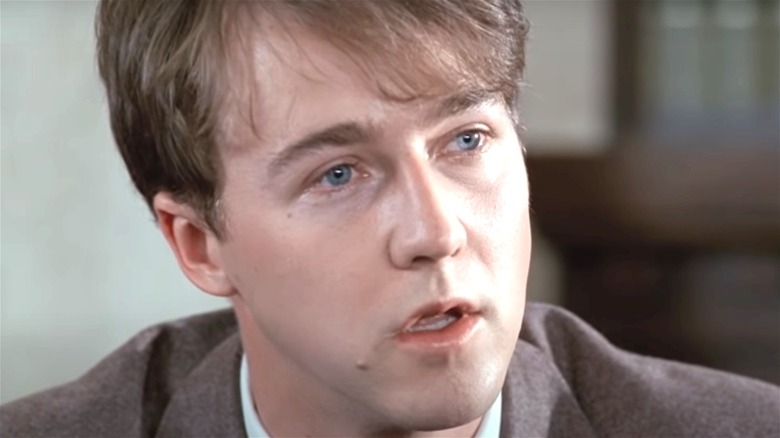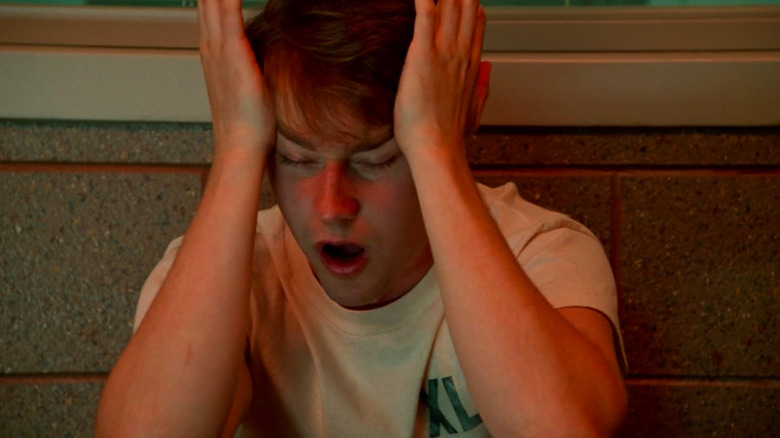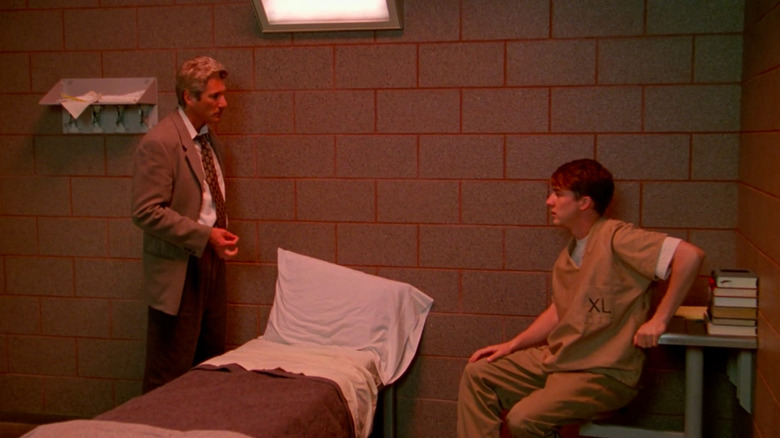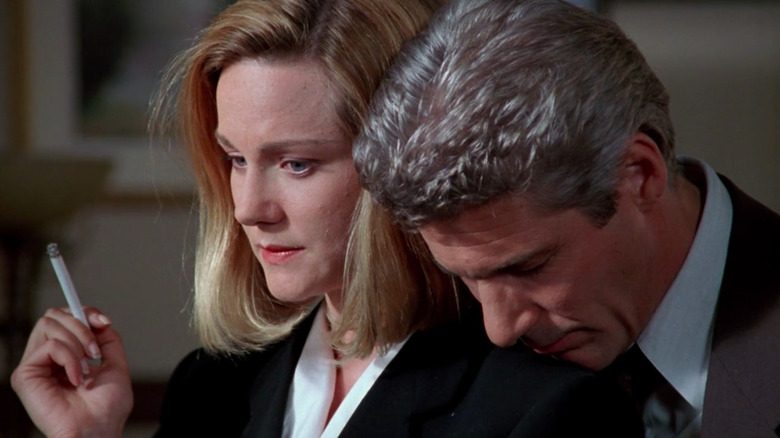The Ending Of Primal Fear Explained
"Primal Fear" is a 1996 legal thriller directed by Gregory Hoblit, based on a 1993 novel of the same name. The film follows cocky Chicago defense attorney Martin Vail (Richard Gere) as he takes on a dizzying case involving an abused altar boy, a slaughtered archbishop, and corruption at the highest levels.
Vail offers his services pro bono to the gangling 19-year-old murder suspect Aaron Stampler (Edward Norton) with the whole city following the case. What he doesn't realize, though, is that the case isn't cut and dry — Stampler has a few tricks up his sleeve. Twist after twist complicates the case, and Vail's team must switch gears when Roy, Stampler's violent split personality, emerges and confesses to the murder of the abusive archbishop. They can't switch to an insanity plea mid-trial, so they decide to provoke an episode while he's on the stand. The plan works, though Roy attacks prosecutor Janet Venable (Laura Linney), Vail's former lover.
That clever court maneuver seems like the final big reveal, but Stampler has one more secret: He was bluffing the entire time. "There never was ... an Aaron, counselor," he cooly tells a stunned Vail. The attorney walks out silently as the boastful murderer continues to taunt him.
Let's break down the ending of "Primal Fear."
How did The Butcher Boy of St. Mike's pull it off?
He may have been dubbed "The Butcher Boy of St. Mike's," but Stampler had a boyish bumbling Southern charm. After all, with a baby face, a tragic backstory, and a carefully enacted stutter, how could anyone believe he stabbed a beloved religious leader multiple times and carved a library code into his chest?
To get away with it, the devious teenager mimicked the symptoms of Dissociative Identity Disorder, "a mental process which produces a lack of connection in a person's thoughts, memories, feelings, actions, or sense of identity" (via WebMD). It has multiple causes, "including severe trauma during early childhood."
"It's textbook multiple personality disorder," reveals Dr. Molly Arrington (Frances McDormand), unaware that she's being deceived. Her diagnosis validates his alleged blackouts, meaning that Roy was responsible, not Aaron. "This is not a criminal we're dealing with," she tells Vail, explaining his history of abuse. "It's a sick kid."
The act may not hold up under the thorough court-appointed medical examinations, but as Vail assured him, he'd be out free in no time. Had he not mentioned Venable's neck, which he attempted to break in the courtroom, Vail would've had no idea.
"Come on, Marty, I thought you had it figured there at the end," he cruelly teases. For his portrayal of Stampler in his debut film role, Edward Norton was nominated for an Academy Award for Best Supporting Actor and won the Golden Globe Award for Best Supporting Actor (via IMDb).
Vail's most primal fear is exposed
While the self-described "big shot attorney" admits that he can be arrogant, Vail takes his job more seriously than anyone realizes. He relishes in the money and the glory, the magazine interviews, and compliments from strangers. However, above everything else, he believes in defending clients who might otherwise have no chance.
"I believe in the notion that people are innocent until they are proven guilty. I believe in that notion because I choose to believe in the basic goodness of people," reveals an intoxicated Vail. "I choose to believe that not all crimes are committed by bad people, and I try to understand that some very, very good people do some very bad things."
Vail's confidence in his job was shattered by his client's deception, believing that he had saved the life of a troubled young man. "We're a great team, you and me," Stampler tells him. "You think I could have done this without you?"
How will this blow to his moral compass affect his future cases? Will he continue to believe that people are inherently good, or will he become as jaded and sloppy as the court-appointed attorneys he previously looked down on for not caring about their clients?
"Hey, you're gonna thank me down the road because this is going to toughen you right up, Martin Vail," calls out Stampler. "You hear me? That's a promise."
What's next for Janet Venable?
Despite their relationship fizzling out, Vail and Venable maintain a flirty professional rivalry throughout most of "Primal Fear." He says they were dating, while she says it was a one-night stand that went on for six months.
Either way, the Stampler case interferes with their will-they-won't-they situation. After Vail introduces the shocking VHS tape as evidence against the archbishop and she begins to clash with the corrupt state attorney John Shaughnessy (John Mahoney), Venable's career is in jeopardy.
After being attacked by Roy in the courtroom, plus the added one-two punch of presumably losing her job and realizing she'd been used as a pawn by Vail, she is visibly shaken. She's last seen smoking alone in an office, processing what happened and what will happen next.
Vail and Venable share a tender moment before he leaves her to reflect, so it's fair to assume this case isn't the end for them. She expresses concern for losing her job, but he reassures her that she "should've left them years ago."
Whether it's to grab drinks or just talk shop, a reconciliation is likely. Both were burned by Stampler and in need of someone to confide in as they move forward in their careers.



